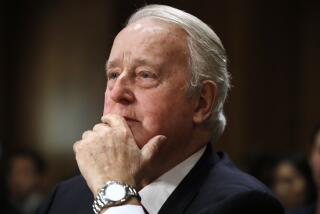No Progress as Mulroney, Premiers Meet : Canada: Language bedevils talks as the deadline nears for ratification of 1987 accord. ‘Tough sledding’ is reported at the conference, which continues today.
- Share via
OTTAWA — No solution to Canada’s growing constitutional and linguistic problems emerged Monday as Prime Minister Brian Mulroney completed a second day of make-or-break talks with this country’s 10 provincial premiers.
Months of debate over a package of constitutional amendments has awakened such sharp bitterness over language issues in Canada that some analysts fear the country could finally split into French and English-speaking sub-states, as it last threatened to do 10 years ago.
Mulroney called all the provincial premiers to Ottawa this week to cool off the crisis--an unusual move here that would be equivalent to President Bush summoning all 50 U.S. governors to Washington for high-powered negotiations.
“It’s tough sledding in there,” Mulroney said as he walked out of the final, closed-door session of the day. “We have a long way to go.” He declined to answer a reporter’s question about whether he thought the conference, which will continue today, would succeed.
By late afternoon Monday, the only good news coming out of the meeting was that no one had yet walked out in a huff.
Canadians perceive the talks as a crucial event for their country. Wags called Sunday’s working dinner, which opened the negotiations, “The Last Supper.”
And when the premiers began arriving at Ottawa’s futuristic Museum of Civilization for the first round of talks, a crowd of demonstrators greeted them with placards showing the Canadian maple leaf being torn in two and bearing slogans pleading with them not to let the country break apart.
Some sang “O Canada,” the national anthem, while Mulroney made brief remarks to the crowd.
“One Canada, indivisible, renouncing all kinds of separations,” called protester Deepak Massand, an India-born Montrealer who sported images of the Quebec and Canadian flags on his T-shirt. Massand, whose family sought safety in Canada during the bloody partition of British India into modern-day Pakistan and India, was horrified to think that his adopted country might now split apart, too.
The premiers went into the first day in fairly good spirits, but as the talks moved into their second day and it became clear that no easy compromise would be forthcoming, the mood soured. The main sticking point is the formula by which Canada amends its constitution. Quebec wants to have a veto over constitutional amendments; some other premiers want to deny Quebec this power.
Canada has arrived at this impasse through Mulroney’s attempts to get Quebec to sign the national constitution. Quebec has resisted signing the document for years, citing as many as 22 objections. Mulroney decided to win Quebec over, and in 1987, he brought the country’s 10 premiers together at a resort called Meech Lake, to amend the constitution in ways palatable to Quebec.
Quebec’s premier, Robert Bourassa, narrowed Quebec’s list of objections to just five items, and presented them to the Meech Lake gathering as his province’s “minimal demands” for signing the constitution. The other nine premiers accepted the demands, and most Canadians assumed that the so-called Meech Lake Accord would be ratified without a hitch by the legal deadline of this June 23.
But before ratification could be completed, various provinces held elections and elected new premiers. Three of the newcomers--those from Manitoba, Newfoundland and New Brunswick--have repudiated their predecessors’ support for the Meech Lake Accord, saying it gives too much power to Quebec and could cause a variety of problems for the country.
Since then, the country’s political leaders have been engaged in an increasingly high-stakes game of chicken to see who will break first: Whether the three holdout premiers will break down and ratify the accord, or whether Bourassa will back down on one of his five demands.
Bourassa is under intense pressure in his home province not to give an inch. Anything resembling a concession will be used against him by his main opposition, the Parti Quebecois, which advocates secession for the province.
More to Read
Sign up for Essential California
The most important California stories and recommendations in your inbox every morning.
You may occasionally receive promotional content from the Los Angeles Times.













